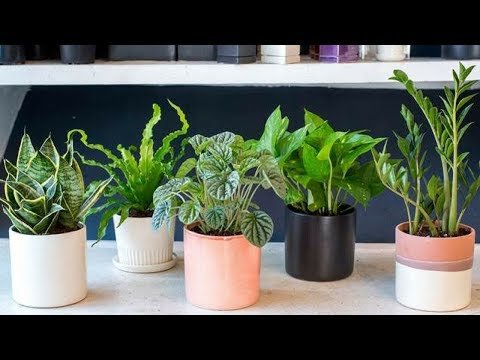No one wants to kill their houseplants, but sometimes our fussier companions from the plant world cannot thrive indoors and wind up suffering. There are plenty of houseplants that are simple and easy to grow and won’t need much care from the average person. Some houseplants are so forgiving that anyone can grow them, from water-sipping succulents to unique air plants.
The following are 10 easy-to-take-care of house plants.
Chinese Evergreen (Aglaonema commutatum)
It proves that you can grow attractive and appealing plants that can also withstand harsh conditions at the same time. These hardy houseplants tolerate low light and moderate drought and have unique variegated leaves ranging from dark green to yellow and even silver. Partial sunlight and regular watering is preferred, but it can tolerate less than that, like artificial light and only one drink a month. All of these features make it a good first houseplant or one suitable for beginners who don’t have much time to devote to it.
Ponytail Palm (Beaucarnea recurvata)
Ponytail palms are native to eastern Mexico, where outdoor examples that have been over 350 years old have been found. Despite its common name, agaves are actually succulents that belong to the agave family. With its expanded stem structure, a forgiving houseplant, it makes a very drought-tolerant plant. It grows in a very sunny environment, but it also tolerates partial shade.
Sago Palm (Cycas revoluta)
Sago palms are another popular houseplant with an inaccurate common name — they are actually members of the genus Cycas, a lineage of ancient plants that dates from the Jurassic period. A mature plant can take decades to propagate, making it a poor choice as an indoor plant. It needs little to no repotting and is quite drought tolerant.
It is also extremely toxic both to humans and animals, and is not suitable for houses with young children or pets.
Snake Plant (Sansevieria trifasciata)
With striking vertical leaves, the snake plant is one of the worlds most recognizable houseplants. Although it prefers bright light, it can also stand partial shade and is suitable for most indoor environments. A member of the succulent family, its thick leaves store water, and it prefers being neglected over over watering. But watch out for the fact that they are invasive, so keep a close eye on them during the summer.
ZZ Plant (Zamioculcas zamiifolia)
ZZ plants make great houseplants, because they have attractive, glossy leaves and an easy care regimen. Although it thrives under imperfect conditions, it won’t be bothered by the occasional oversight from its owner. It requires on low water and light, and will exist happily even in rooms with a lot of artificial light. You should still water it, but as it likes its soil to be completely dry between waterings, you can water it as infrequently as once a month.
Air Plant (Tillandsia spp.)
Consider an air plant if you are certain that you cannot devote much time to maintaining a houseplant, which allows it to survive with almost no human involvement. Epiphyte plants require no soil — and almost no water. They can be grown in glasses, on a bed of stones, or even just sitting on a table. In a misty environment, such as a bathroom, they can be neglected for years. However, it is advisable to mist or dunk it in water occasionally to ensure it remains hydrated.
Aloe (aloe vera)
Known for its medicinal uses, like treating burns and cut, aloe is a favorite houseplant that requires little water. Small slices from plants can be used to treat these without harming them. This plant prefers sandy, dry soil and thrives in direct sunlight. As a succulent, it can hold onto moisture effectively.
Parlor Palm (Chamaedorea elegans)
Parlor palms have been popular houseplants for more than a century, which is understandable. Originally from Central and South America, this shade-tolerant plant is tolerant of low light and a looser watering schedule. The plant can grow big, reaching heights of over three feet at maturity, which makes it an ideal first houseplant.
English Ivy (Hedera helix)
Growing easily in a variety of conditions, English ivy prefers moist, shady conditions, and it even thrives in a bathroom. Plants grow quickly, are easy to train, and can be an interesting addition to shelves or mantles. It must be noted that in the United States, this species is also aggressive and should not be grown outdoors, or thrown in a compost pile.
Jade Plant (Crassula argentea)
It is a large succulent that has a woody stem that resembles a tree once it reaches a certain height. The succulent will fare best if watered infrequently since its thick, waxy leaves are excellent at retaining water. It is better to be conservative than overwater it. To train the plant to grow vertically and reveal its unique stem, trim its heavy, fleshy leaves regularly so that their weight does not cause it to sag.
______________________________________________________________________________________________________________________________
There are still many recent and interesting articles about Snake Plants..
..as well as other unique information from All Things Gardener..
For further information and other inquiries..
..you can contact us here

